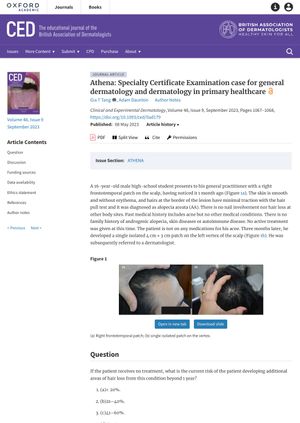Athena: Specialty Certificate Examination Case for General Dermatology and Dermatology in Primary Healthcare
May 2023
in “
Clinical and Experimental Dermatology
”

TLDR Alopecia areata has a high chance of persisting and relapsing, with a significant risk of total hair loss, especially if it starts in childhood.
A 16-year-old male was diagnosed with alopecia areata (AA), an autoimmune disease causing severe nonscarring hair loss. The patient developed multiple patches of hair loss within 6 months of initial presentation, indicating a 35% risk of the condition persisting beyond 1 year. If AA persists beyond 1 year, it is defined as chronic. The risk of developing alopecia totalis (AT) or alopecia universalis (AU) is 30% and 15% respectively for those with persistent AA beyond 1 year. Approximately 66% of affected individuals may show hair regrowth within 5 years, but the overall incidence rate of relapses is 85%. Factors indicating a poor prognosis of AA include onset before the age of 12 years, disease duration > 1 year, presence of multiple discrete patches of hair loss on the scalp > 50% of the surface area, progression to AT/AU, associated nail changes, associated conditions such as Trisomy 21 and atopy, and a family history of AA or organ-specific autoimmune diseases. Early onset of AA, especially in childhood, results in a greater degree of hair loss and persistence of the disease.







